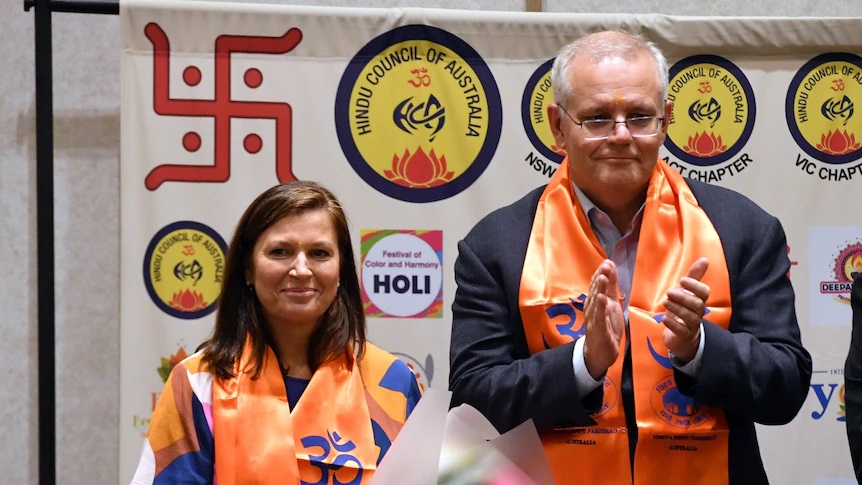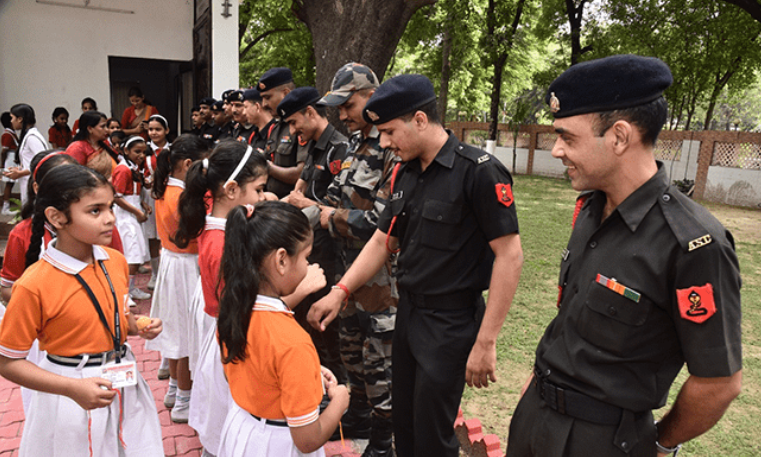
By Meghna Bali and Ariel Bogle / ABC
Prime Minister Scott Morrison and Opposition Leader Anthony Albanese have been photographed wearing saffron scarves bearing the symbol used by a right-wing Hindu nationalist group from India that has been accused of orchestrating brutal attacks on Muslims and Christians.
The photo-ops took place earlier this month as the Prime Minister and the Opposition Leader attended separate events where they were courting the support of voters among Australia’s Indian diaspora.
However, the scarves featured the banyan tree logo used by the Vishva Hindu Parishad (VHP) India, an affiliate of Rashtriya Swayamsevak Sangh (RSS), a far-right Hindu nationalist organisation that aims to create an ethnic Hindu-majority state.
The scarves also included the name of Vishva Hindu Parishad Australia, a legally separate entity to VHP, which also uses the symbol as its logo.
On Saturday night, the Prime Minister and his wife, Jenny, Immigration Minister Alex Hawke, and several Liberal candidates were presented with the scarves at a meet-and-greet event in Sydney that was hosted by the Hindu Council of Australia (HCA), of which VHP Australia is a member.
Earlier this month, Anthony Albanese and Kristina Keneally were also photographed wearing the same scarves.
Both HCA and VHP are registered Australian charities, with a substantial portion of their activities funded by government grants, including teaching the ancient Sanskrit language, preserving Hindu culture and providing financial and medical aid to vulnerable members of the diaspora.
During the 2022 election, the Liberal and Labor campaigns have made concerted efforts to appeal to the growing Indian-Australian community, especially in key Western Sydney electoral races such as in Greenway and Parramatta, and the Victorian electorate of La Trobe.
Part of that election strategy has been engaging with organisations such as HCA, to discuss issues affecting the Hindu and Indian community in Australia, including aged care, India-Australia trade partnerships, migration visas and ensuring the swastika would remain a sacred symbol for Hindus, Buddhists and Jains.
Keysar Trad — chief executive of the Australian Federation of Islamic Councils — said that, if political leaders were not aware of the meaning behind the logo, they should say so.
“People in Australia have a right to know, so that we can see where our political representatives stand on issues of discrimination against Christians and Muslims,” he said.
Mr Trad says VHP India is “a xenophobic, and religion-phobic group that only sees space for people of one particular faith and everybody else, according to them, can go to hell. This is wrong. We don’t accept that.”
In a statement, VHP Australia national president Subramanian Ramamoorthi wrote “the prime aim of Vishva Hindu Parishad of Australia is to promote the principles of unity in diversity, social cohesion, multiculturalism, harmony, inclusiveness and pluralism in Australia”.
He specified that the organisation did not financially support VHP in India.
The Labor and Liberal Party campaigns did not respond to a request for comment.
Who are the VHP in India?
VHP India was founded in 1964 with the objective to “organise-consolidate the Hindu society and to serve [and] protect the Hindu Dharma [religion]”.
It was set up to counteract — what members viewed as — aggressive and unwelcome proselytising among Hindus by Christians, Muslims communists and atheists.
VHP in India is opposed to all religious conversions and aims to strengthen Hindu education and observance around the world.
According to Professor Mohan Dutta of New Zealand’s Massey University, who has studied Hindu Nationalism, the VHP is positioned as a cultural organisation, which aims to build the cultural pedagogy of Hindutva, a form of Hindu Nationalism that aims to build a monolithic Hindu culture or identity.
He compares VHP India to the Proud Boys, a group known for its involvement in the January 6, 2021 attacks on the US Capitol and their anti-Muslim rhetoric.
A 2020 report by Australia’s Department of Foreign Affairs describes VHP India as a member of the “Sangh Parivar”, an umbrella term for a group of Hindu nationalist organisations affiliated with the Rashtriya Swayamsevak Sangh (RSS) paramilitary volunteer movement.
The RSS counts Indian leader Narendra Modi as one of its approximately five to six million members.
South Asia historian and an associate professor at Rutgers University Audrey Truschke told the ABC that, in India, “the VHP are widely known to be a militant organisation and to use violence regularly and vociferously, typically against Muslims”.
Dr Truschke said Australian politicians who wore the scarves featuring the VHP symbol could make VHP India look like “a legitimate part of a sort of cultural conversation, a political network”.
“That is a huge problem because they are extremist … and it bears reminding that Hindu nationalism, it’s not violent in theory, it’s violent in practice every single day in India right now,” Dr Truschke said.
Last month, VHP India co-organised a religious procession in Delhi which ended in what news outlets described as one of the worst major clashes between Hindu and Muslim communities since March 2020.
Attendees shouted the “Jai Shri Ram” Hindu nationalist slogan and people carried saffron flags near a mosque.
In March, the Indian organisation opposed Muslim traders doing business near Hindu temples during religious festivals.
VHP India activists were also detained in Gujarat state in February for protesting on school grounds against young Muslim students wearing the hijab.
In 1999, a mob of Hindu extremists — led by a local leader of VHP India’s youth wing ‘Bajrang Dal’ — burned to death an Australian missionary, Graham Staines, and his two young sons as they slept in their car.
The leader was sentenced to life in prison.
Mr Staines had worked for more than 30 years in a leper colony in India, and local authorities concluded that Christian conversions were a motivating factor behind the murders.
VHP’s Australian connection
Dr Truschke said overseas chapters of VHP did not “tend to be violent”, but they do support VHP in other ways, including access to senior members of the organisation.
“They provide material support to the VHP back in India. They provide a platform for VHP leaders,” she says.
Sociologist Goldie Osuri of the University of Warwick, who has also studied transnational Hindutva, agreed.
She said that, while international chapters of VHP were legally separate, she rejected the idea that they had no links to the Indian organisation.
“It’s not some autonomous thing happening separately from each other,” Dr Osuri told the ABC.
The VHP website mentions VHP Australia in its list of Hindu organisations abroad.
VHP Australia has also hosted VHP India’s joint general secretary and coordinator of international operations, Swami Vigyananand, several times, and as recently as 2016.
Current VHP Australia national president Subramanian Ramamoorthi did not respond to direct questions about VHP Australia hosting Swami Vigyananand.
In an archived 2011 version of their website, VHP Australia had a section titled “Origins of VHP” where it references some of the Indian organisation’s ideology.
“The changing political and religious practices in India and in the world in the last millennium brought many culturally superstitious, socially dividing and religiously immoral practices, resulting in the deterioration of the core value of Sanadhana Dharma [Hinduism],” it originally said.
It went on to state that “the elders of Hindu Dharma realized the need to bring all Hindus [sic] together and reinforce the bonds of unity and spirit of brotherhood and mutual understanding … to unite various religious groups and sects and to enable Hindus to present a united socio-cultural front. This was the birth of Vishwa Hindu Parishad (VHP).”
That section has been removed from the website, from at least 2012.
In a statement, Hindu Council of Australia vice president Surinder Jain wrote “we support Australia as a secular, multicultural country where people from different faiths, and no faith, can live and work together in peace and prosperity”.
“Whilst individuals associated with VHP in India have at times responded to violence from other communities with counter-violence, which we condemn, Australian Hindus oppose all forms of violence and coercion,” his statement said.
He reiterated that the VHP in Australia was a completely independent, separate organisation to VHP in India, and that “no violence or wrongdoing of any kind has ever been associated with VHP in Australia”.
Mr Trad has called for VHP Australia to change its name.
“If you really want to support the multicultural, multi-religious values in Australia, then you pick a name that’s not associated with so much hatred and bigotry.”
Shanti Raman, the Australia and New Zealand lead for Hindus for Human Rights, said the tensions across the Indian diaspora did not represent the voices of all Hindus.
“Hindu cultural practice can be about acknowledging the divine in all of us … we do not feel that Islamophobia or any form of stomping on minorities, including caste, should be part of religious practice,” Dr Raman said.
This article first appeared on abc.net.au






